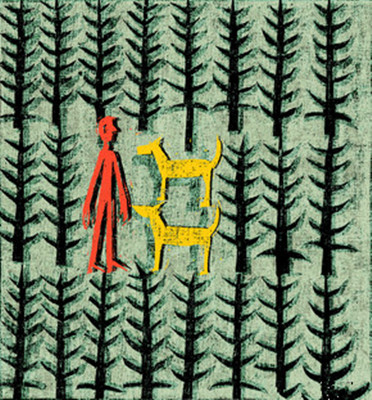隱居
Sweet spot
甜蜜點(diǎn)
A journey around living alone
獨(dú)居之旅
Consolations of the Forest: Alone in a Cabin in the Middle Taiga.
《森林的慰藉:針葉林中的木屋獨(dú)居之旅》
Consolations of the Forest: Alone in a Cabin in the Middle Taiga. By Sylvain Tesson, translated by Linda Coverdale.
《森林的慰藉:針葉林中的木屋獨(dú)居之旅》,Sylvain Tesson著,Linda Coverdale譯。
SYLVAIN TESSON, a French writer, is known for books about his journeys across the steppes and mountains of Central Asia. “Consolations of the Forest”, which won the Prix Médicis in 2011 and is his first book in English translation, is different. It is about staying put. For six months in 2010—from February to July—Mr Tesson lived alone in a forest cabin beside Lake Baykal in Siberia.
SYLVAIN TESSON,這位法國(guó)作家,因其在亞洲中部跋山涉水的一段旅程而知名。《森林的慰藉》,不僅榮獲2011年度梅迪西斯文學(xué)獎(jiǎng),還是該作家的第一本英譯作品,可謂與眾不同。該書(shū)主要談?wù)摼恿舳ㄋv述2010年2月至7月,Tesson先生在西伯利亞貝加爾湖旁的森林小屋度過(guò)的六個(gè)月獨(dú)居生活。

The nearest village was 75 miles away, the closest neighbour several hours' walk. There were no roads. Solar panels gave him some electricity, but otherwise, fortified by vodka and cigars, he lived the simple life, much of it reading and thinking—about nature, time and himself. “Nothing is as good as solitude,” he says, adding: “The only thing I need to make me perfectly happy is someone to whom I could explain this.” Instead he described the pleasures to himself in a diary; “Consolations of the Forest” is the happy result.
最近的村莊距他有75英里之遠(yuǎn),最近的鄰居家足有好幾小時(shí)的路程。林中也無(wú)路。太陽(yáng)能板為他提供基本的電力需要。除了伏特加和雪茄這點(diǎn)嗜好,他基本過(guò)著簡(jiǎn)單的生活,大多數(shù)時(shí)間用來(lái)讀書(shū)、思考—關(guān)于自然、時(shí)間及自省。“獨(dú)居是無(wú)可擬比的,”他說(shuō),“我唯一要做的就是向他人詮釋這種感受,這讓我欣喜若狂。”為此他以日記形式記載著這份喜悅,《森林的慰藉》便是這喜悅的成果。
Why did he do it? The question runs through the book like a tune. Was it a revulsion against modernity, against traffic and cheeseburgers? Or was it an act of political refusal? A hermit's life, he says, “is more anti-statist than a protest demonstration bristling with black flags”. Was it a wish to tread lightly on the earth, not to exploit it? Or perhaps it was a way to plumb his inner life—“the nuances of my own tectonics”. As he chops wood, guts fish and dodges brown bears, Mr Tesson considers these questions in the company of philosophers and poets, misfits and refuseniks.
他為何要獨(dú)居呢?這一疑問(wèn)猶如和諧曲般貫穿全書(shū)。是對(duì)現(xiàn)代生活,擁擠的交通,速食漢堡的反感?還是政治抗議行為呢?這種隱士般的生活,他說(shuō)道,“比起舉黑旗抗議游行更具有反國(guó)家主義精神。”或許這是對(duì)人與自然和諧相處、不再索取的希冀?又或許是他對(duì)內(nèi)心生活的探索——“自身構(gòu)造的細(xì)微差別”。伴隨著砍柴、剖魚(yú)、躲避棕熊,Tesson先生通過(guò)哲學(xué)家、詩(shī)人、那些格格不入、反抗主義者的視角思考這些問(wèn)題。
Books inhabit Mr Tesson's inner and outer landscapes. Two ducks landing on open water remind him of reading and suddenly alighting on a good phrase. The sound of cracking ice brings Schopenhauer to mind. Staggered by the view from a mountaintop, he can think only of Hegel's words: So ist. His writing is elegant and urbane, full of paradoxes, aphorisms and conceits: “The sky has powdered the taiga [the northern forest], shaking velvety down over the vert-de-bronze of the cedars. Winter forest: a silvery fur tossed onto the shoulders of the terrain.” He verges on whimsy at times, and there are purple patches: “A russet moon rose tonight, its reflection in the shattered lake ice like a blood-red Host on a wounded altar.”
文學(xué)占據(jù)了Tesson的內(nèi)心及現(xiàn)實(shí)。浮在水面的兩只水鴨能讓他想起曾經(jīng)閱讀時(shí)忽然捕捉到的優(yōu)美措辭。冰裂之聲讓他想起叔本華。站在山頂俯視一切壯闊之景時(shí),他心里只有黑格爾的那句:就是這樣。他的作品語(yǔ)言優(yōu)美、雅致,充滿悖論、各種金句、天馬行空的幻想:“天空粉飾那針葉林,輕柔地散落在青綠杉樹(shù)之上。森林之冬:大地之肩披上一層銀色毛皮。”他總會(huì)萌生些奇妙的念頭,附上辭藻華麗的句子:“今夜,一輪黃褐色明月升起,倒影在破冰的湖面,就像那破敗祭壇上血紅的圣人。”
Tongue in cheek? Perhaps. Yet, for all his playfulness, Mr Tesson is in earnest. He loves thetaiga and understands the Russians' almost mystical attachment to it. He shudders at the occasional invasions of gun-toting businessmen in blaring 4x4s, and he walks for hours to meet odd loners in their scattered cabins. One of them gives him two puppies who become his much-loved companions and his wisest philosophers. Move over Schopenhauer. Aika and Bek know where the “sweet spot” is—the present moment, that special place “between longing and regret” that Mr Tesson is ultimately in search of.
華而不實(shí)?或許吧。但在他所有嬉言之下卻有著一顆虔誠(chéng)的心。他喜愛(ài)針葉林,并理解俄國(guó)人對(duì)針葉林近乎謎一樣的依戀。他會(huì)被偶爾帶槍入境、開(kāi)著驅(qū)動(dòng)車嘟嘟按喇叭的商人嚇壞,還會(huì)徒步走上幾小時(shí)去見(jiàn)一些奇怪的獨(dú)居者,他們的木屋分散在森林中。其中一人給了他兩只小狗,它們是Tesson鐘愛(ài)的伴侶,是至賢的哲學(xué)家。勝過(guò)叔本華。Aika和Bek知道如何尋找“甜蜜點(diǎn)”—那個(gè)介于“渴望與遺憾”的特別存在,那正是Tesson的心之所向。












